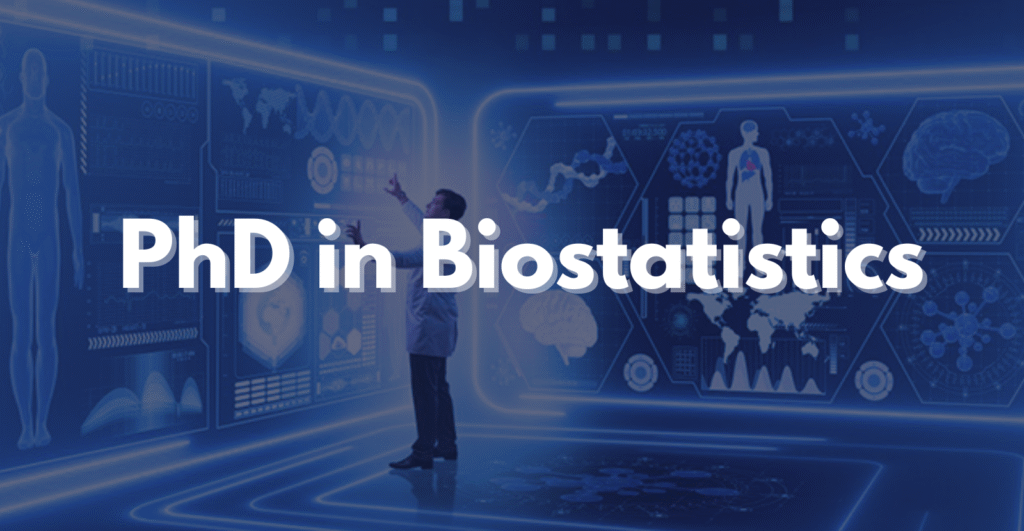In an era defined by big data and evidence-based decision-making, a single number can determine the fate of a new drug, shape public health policy, or unlock the genetic secret of a disease. Who are the architects behind these pivotal insights? They are advanced biostatisticians.

Pursuing a PhD in Advanced Biostatistics is a commitment to becoming more than a data analyst; it’s a journey to becoming a principal investigator of the scientific method itself. This path demands rigorous intellectual discipline but offers unparalleled rewards for those who are passionate about using mathematics and statistics to solve real-world biological and medical challenges. If you’re poised at this critical decision point, here are the five powerful reasons why a doctorate in Biostatistics is a transformative career investment.
1. Become the Architect of Scientific Discovery
A PhD elevates you from implementing statistical tests to designing the very framework of research. You will learn to develop novel methodologies for clinical trials, create sophisticated models for genetic sequencing data, and establish the statistical principles that ensure scientific findings are valid and reliable. You won’t just analyze the data; you will define how the data is collected and interpreted, serving as the essential collaborator on any major research project.
2. Command a Unique Intersection of Skills
With this degree, you can work at the intersection of three highly sought-after fields: computer science, medicine, and statistics. You will become proficient in:
Advanced Statistical Theory: Survival analysis, Bayesian techniques, and longitudinal data analysis.
Computational Proficiency: SAS, R, and Python programming and high-performance computing.
Domain Expertise: Comprehensive knowledge of clinical medicine, epidemiology, and biology.
3. Unlock Leadership Roles in High-Stakes Industries
Your ticket to the most lucrative and powerful jobs in the industry is a PhD. You can pursue positions like these with this degree:
Senior Biostatistician: Heading clinical trial statistical strategy for major pharmaceutical companies (Pfizer, Roche, Novartis).
Research Scientist: Advancing public health policy at agencies such as the CDC or WHO.
Obtaining NIH grants to direct your own studies at a university or research institute is known as principal investigator.
A quantitative scientist works on complex data problems in the finance or technology industries.
4. Lead in the Fight Against Global Health Challenges
The COVID-19 pandemic underscored what experts already knew: biostatisticians are essential heroes in public health. From modeling infection rates and vaccine efficacy to tracking variants and evaluating interventions, your skills can help curb outbreaks, manage resources, and save lives on a global scale.
5. Build a Legacy—Not Just a Resume
More than just a certification, a PhD in biostatistics is evidence of your capacity for creativity, leadership, and significant societal contribution. Your efforts will have a long-lasting effect on science and human health, whether you’re leading a clinical trial to approval, publishing innovative methodology, or coaching the upcoming generation of scientists.
Is a PhD in Biostatistics Right for You?
Resilience, intellectual curiosity, and a love of accuracy are necessary for this path. Comfort with complex maths, programming (R, SAS, and Python), and a desire to learn new things in the face of swift advancements in science and technology are prerequisites.
A PhD in biostatistics, however, might be the perfect career accelerator for you if you want to do more than just work with data; if you want to use it to inform strategy, drive decisions, and improve millions of people’s health.
For the future leader, the innovator, and the problem-solver: We need your skills. This is your time.
- Explore accredited PhD in Advanced Biostatistics
- Schedule a free meeting with our experts.
FAQ: PhD in Advanced Biostatistics
Q: What background is needed for a PhD in Advanced Biostatistics?
A: Strong quantitative skills are essential for a PhD in Advanced Biostatistics. Most applicants hold degrees in mathematics, statistics, computer science, biology, or related fields, with advanced coursework in calculus, linear algebra, probability, and programming.
Q: How long does a PhD in Advanced Biostatistics typically take?
A: A PhD in Advanced Biostatistics usually requires 4–5 years of full-time study, encompassing rigorous coursework, comprehensive exams, original research, and dissertation defense.
Q: How does a PhD in Advanced Biostatistics differ from a degree in Data Science?
A: While both fields emphasize analytics, a PhD in Advanced Biostatistics focuses specifically on biological, medical, and public health applications, with deep training in study design, statistical inference, and regulatory standards. Data science is broader and often oriented toward business or tech applications.
Q: Can I pursue industry roles after a PhD in Advanced Biostatistics?
A: Yes! Graduates of a PhD in Advanced Biostatistics are highly sought after in industry, particularly in pharmaceuticals, biotechnology, CROs (Contract Research Organizations), and health-tech companies.
Q: Is funding available for a PhD in Advanced Biostatistics?
A: Most reputable programs offering a PhD in Advanced Biostatistics provide full funding via research assistantships, teaching roles, training grants, or fellowships, covering tuition and offering a stipend.
